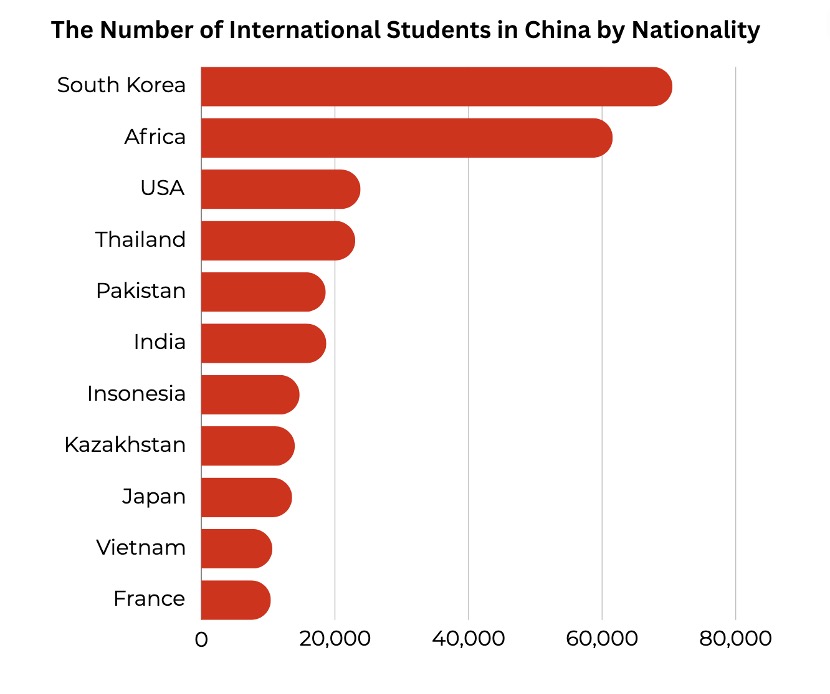
Introduction
Are you considering studying as an international student in China? It’s important to be financially savvy when studying abroad, and China is no exception! Whether traveling to China to learn Chinese, or to study a specialized degree, this guide will cover the cost of living in China. From tuition fees and scholarships to accommodation options and daily expenses, we’ll also explore some cost-saving tips for your stay in China.

How Much Does It Cost to Live in China?
The cost of living in China varies by region, however a budget of US$9,000 per year will generally comfortably cover tuition, accommodation, health insurance, utilities, and daily expenses in China’s biggest cities.
| Expense | Lower Limit | Upper Limit |
| Tuition + Application Fee | $3,100 | $11,100 |
| Visa + Medical Examination + Health Insurance | $250 | $350 |
| Accommodation | $1,800 | $10,000 |
| Utilities (Water, Gas, Electric, Phone, Internet) | $80 | $140 |
| Food | $1,800 | $2,500 |
| Entertainment | $720 | $2,400 |
| Travel | $180 | $400 |
| Total: | $8,650 | $28,190 |
Cost of Living in China for International Students Per Year
Is China a Safe Place to Study?
China is generally considered a very safe place to visit and study, but it’s important to always obey local customs and laws. Particularly in bustling cities like Beijing and Shanghai, it’s also vital to be aware of scams!
International Students in China: In Numbers
The number of international students in China reached almost half a million in 2018. During the Covid-19 pandemic, the Chinese government closed Chinese visas for international students. As China has since reopened to international students, there is a plan to recover the number of international students in China to pre-pandemic numbers by 2025.

Tuition and Scholarships in China
When planning to study abroad in China, it’s important to consider the costs of tuition. In this section, we’ll explore the costs associated with tuition, application fees, visa requirements and financial support.
The Cost of Studying in China
Public Universities
Application fees vary depending on the university, major, and degree level. On average, application fees range from US$90 to $150 and are typically not more than $200. However, it’s essential to note that certain specialized programs may have higher application fees. Additionally, the application fee tends to be higher for universities that rank higher on China’s Universities List.
While application fees are a one-time expense, tuition fees are recurring and vary based on the program and university. One of the significant advantages of studying in China is the relatively low tuition fees compared to Western countries like the UK and the USA. On average, tuition fees in China range from $3,000 to $11,000, which makes it an attractive option for international students.
Private Universities
Private universities in China generally have higher tuition fees. While most courses at public universities cost less than $30,000 per year, certain specialized programs such as MBAs may cost over $40,000 annually.
It’s important to be aware that tuition fees can also be significantly higher in private institutions affiliated with foreign countries. Hence, choosing the right university and program is essential to managing your education costs effectively. For example, New York University (NYU) Shanghai, a collaboration between NYU and East China Normal University, has tuition fees exceeding $50,000 per year.
Tuition Fee Trends in China
According to Reuters, in 2023 universities in China raised tuition fees by as much as 54%. This underlines the importance of staying up to date on tuition fees in China, as they are subject to change over time. Check with your university website or admissions office for current pricing.
Visas for international students in China
All international students in China staying longer than six months require a student visa, typically known as an X-Visa. The cost of an X-Visa is approximately $100. Alternatively, if you are planning to stay in China for less than six months, you can apply for a business visa, known as an F-Visa, which costs around $60.
Scholarships and Financial Aid for International Students
To make it cheaper and more accessible for international students to study in China, the Chinese Government Scholarship (CSC) offers an attractive opportunity. The Chinese Scholarship Council provides detailed information about available scholarships, eligibility criteria, and application procedures.
Alternatively, if you are affiliated with a university overseas, there may be opportunities for scholarships and grants through your institution or local government. Be sure to check out available options as it can be a great way to save on the price of living in China!
Accommodation Options for International Students in China
Accommodation costs vary depending on location in China, however the choice of accommodation significantly impacts your comfort and overall cost of living. In this section, we’ll explore the various accommodation options available to international students in China.
How Much is Rent in China?
The cost of rent in China can vary from $150 to $900 per month for most students, depending on your choice of accommodation and location. Here are the top 5 housing options and costs for you to explore ahead of your trip to study abroad in China:
- Student residence halls. Student residence halls are the cheapest and most convenient option when studying abroad in China. Prices depend on location, but you can typically expect to pay between $150 and $350 per month to stay in student residence halls.
- Rent a flat. For more independence and privacy, you can rent apartments in China. It’s also a great way to practice your Chinese as you navigate the rental process! Prices vary significantly based on the city and facilities, ranging from $350 to $900 per month.
- Homestay. Why not stay with a Chinese family and immerse yourself in Chinese language and culture? Prices range from $400 to $600 per month and it’s a great way to meet your chosen family in China!
- Hostel. Hostels offer a convenient option for shorter stays in China. With prices ranging from $10 to $25 per night, it can be a cost-effective way to cover your accommodation needs and meet new friends in the process.
- Live with a roommate. Sharing with a roommate can be a great way to save money when studying in China. Boost your social experience while saving money in the process!
Additional Housing Costs in China
Most student residence halls and rentals in China require a security deposit which costs around $50. For housing or apartment rentals, the deposit is usually 2 months’ rent, which is refundable at the end of the tenancy providing the rental is left in good condition. You can also expect to pay agent commission for rental properties, which can be up to one months’ rent. Down payments to secure the rental are also common, typically 20% of the first month’s rent.
Utility Costs in China
Utility costs in China range from $80 to $140 per month. You should budget $60 per month for electricity, cooling, heating, water, and garbage disposal in China. For mobile phone costs, $15 per month should cover all calls, texts, and data you will need. Internet connection costs around $20 per month, although savings can be made by going with the same provider for phone and internet.
Health Insurance and Medical Expenses
It’s vital to have appropriate health insurance when you visit China. In this section, we’ll explore the essential aspects of health insurance and medical expenses for international students in China.
Health Insurance for International Students in China
It is a requirement for all international students in China to have a comprehensive health insurance policy. The Chinese government mandates that every international student studying in China for over six months must have valid health insurance.
In most cases, your university will offer a group health insurance plan that you can purchase at a reasonable cost. These insurance plans are specifically designed to cater to the needs of international students, providing coverage for a range of medical services and treatments. Ahead of your trip to China, ensure you have appropriate cover and ask your university’s admissions office if there is anything you are unsure of.
Physical Examination for International Students in China
All international students who study in China for more than six months need to have a physical health examination, which costs around $100. The examination can be completed before you arrive, or when you arrive in China. Each city has a medical examination center for international students which is designated by the Chinese government.
Handling Medical Emergencies in China
In the event of a medical emergency in China, the number to call an ambulance is 120. For mental health emergencies, the number is 12320. It is common for call handlers on the emergency lines to speak little to no English, so if you do not speak Chinese, you should enlist the help of a local friend who can assist with interpreting.
Tip: It’s always a good idea to familiarize yourself with local hospitals and health centers on your arrival to China, just in case!
Cultural Insights and Cost-Saving Tips
Studying in China offers a unique cultural experience with quality education. In this section, we’ll explore how to embrace Chinese culture, save money while living in China, and enjoy travel and leisure on a budget.
Embrace Chinese Culture
Take the opportunity to embrace Chinese culture when studying in China. Where possible, steer clear of the ‘international bubble’! Learn the language, join local events, and explore the wide variety of Chinese cuisines (usually at a fraction of the cost of Western food!).
Online Study Resources to Learn Chinese in China
As your Chinese speaking and listening improve through daily life in China, consider Chinese graded readers such as The Chairman’s Bao to improve your reading and writing. You can also sync with Skritter and Hack Chinese for the ultimate Chinese studying experience. Don’t miss out on the opportunity to supercharge your Chinese language study with immersion in China!
Top Cost-Saving Tips for International Students in China
Here are some cost-saving tips to consider when studying abroad in China:
- Plan and budget. Create a budget that covers your living expenses, including rent, utilities, food, transport, and leisure!
- Stay in student residence halls. Staying in student halls is a cost-effective option when studying as an international student in China. Dorms are often government-subsidized, and they can be a great way to meet new friends!
- Eat at the university canteen. University canteens offer affordable and convenient meal choices. A great way to save on your food expenses!
- Use public transport. Public transport in China is extremely cheap and convenient. Take the bus or metro to save on travel expenses.
- Meal prep. Missing a taste of home? Cook your favorite meals in bulk to save!
- Seek out student discounts. Many places in China offer student discounts, such as movie theaters and transport! Always carry your student ID with you to ensure you don’t miss out.
Conclusion
Whether your goal is to learn Chinese, study for a specialized degree, or immerse yourself in Chinese culture, being financially savvy is crucial in making the most of your experience as an international student in China. We hope that with this guide you’ll be well-equipped to make the most of your time in China, both academically and culturally. Make the most of your experience and embrace the opportunities – you’ll never look back!
Author:
Sean speaking to students at Beths Grammar School about his experience of learning Chinese, living in China and founding Newsdle and The Chairman’s Bao.
Sean studied Chinese and Spanish at University of Leeds and founded The Chairman’s Bao alongside Tom Reid in his final year of study in 2015. Current Managing Director of The Chairman’s Bao, he has overseen the company’s growth from university bedroom concept to an international force in the EdTech industry with over 200,000 individual users and over 400 global partner institutions. Sean also launched Newsdle alongside Tom Reid and Oliver Leach in 2021, for students and teachers of Spanish and French. In his spare time, Sean is still a keen language learner and runner. He also sits on the Board of charity Leeds Irish Health and Homes in the UK.
Sean McGibney
























